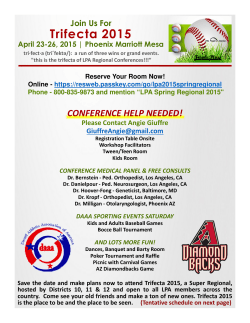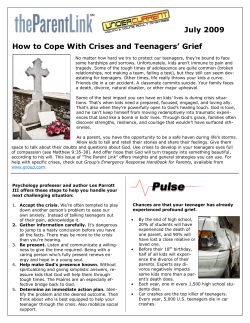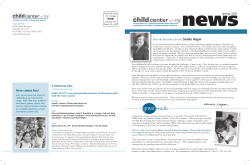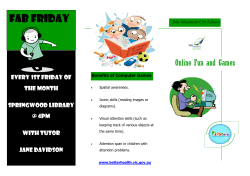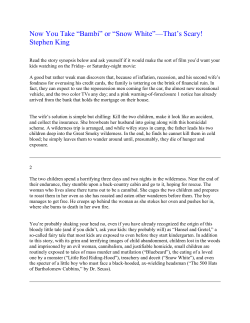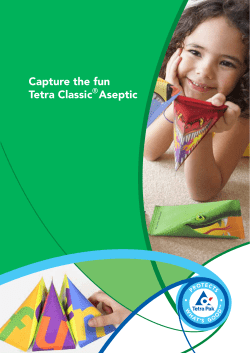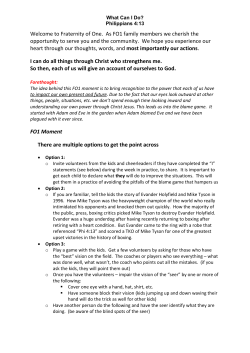
Executive Function Skills at Home
Executive Function Skills at Home No Mind Left Behind: Understanding and Fostering Executive Control--The Eight Essential Brain Skills Every Child Needs to Thrive by Adam J. Cox A favorite books about the Executive Function Skills. Well written, comprehensive and full of practical strategies. His website is amazing too: www.dradamcox.com Executive Skills in Children and Adolescents: A Practical Guide to Assessment and Intervention 2nd Edition (Practical Interventions in the Schools) by Peg Dawson and Richard Guare A good introductory book on Executive Function Skills. Particularly excellent for teachers and parents who need foundational understandings on what the Executive Function Skills are. The Second Edition has lots of additional information and updates. These authors have also written the book Smart but Scattered which has many practical ideas to improve executive function routines in the home setting. I Can Problem Solve Books by Myrna B. Shure These books focus heavily on teaching students how to develop flexible problem solving skills. These are some of the few books I have read that ds not merely say ‘problem solving is an important skill’ but rather truly teaches the reader “how to” teach children the steps to being independent problem solvers. If you work with younger students, her workbooks have terrific premade group lessons to teach problem solving and thinking skills to elementary aged children. Raising a Thinking Preteen: The "I Can Problem Solve" Program for 8- to 12- YearRaising a Thinking Child: Help Your Young Child to Resolve Everyday Conflicts and Get Along with Others Raising a Thinking Child Workbook: Teaching Young Children How to Resolve Everyday Conflicts and Get Along with Others I Can Problem Solve : An Interpersonal Cognitive Problem Solving Program : Kindergarten & Primary Grades How to Talk So Kids Will Listen & Listen So Kids Will Talk by Adele Faber and Elaine Mazlish A classic and exceptional book. Get your kids' cooperation...without arguing. Morning hassles and bedtime battles disappear when you apply the communication techniques these experts have been teaching parents nationwide. You'll learn to: Avoid turning simple conversations into arguments Instruct rather than criticize when correcting your child Choose effective alternatives to punishment Show your child how to make amends Allow him to experience the direct consequences of his actions. Lost in School and The Explosive Child by Ross Green. Both are excellent books for communicating to school professionals about the underlying EF difficulties children with behavioral challenges experience and why they act the way they do. A must read for teachers and parents alike. If you have an explosive child at home this is a must read resource, but I do not recommend you skim the book. Read it cover to cover to really understand collaborative problem solving to work with children who struggle with flexibility. Related resources include the websites: thinkkids.org www.greatschools.org/special-education/health/executive-function-lens-to-view-yourchild.gs?content=1017 http://www.livesinthebalance.org/ This is an OUTSTANDING website with many great videos for learning the collaborative problem solving approach. Strategies for Organization: Preparing for Homework and the Real World by Michelle Garcia Winner This 3.5 hour DVD and handout booklet features the highlights of Michelle's popular all day workshop on this same topic. The information on this DVD is applicable to teaching and treating ALL students, not just those with learning disabilities, and is best for those in 4th through 12th grade. It is an excellent resource! Parenting Teenagers Yes, Your Teen is Crazy!: Loving Your Kid Without Losing Your Mind by Michael J. Bradley Bradley, a psychologist drawing on current brain research, argues that teenagers are basically nuts. While 95 percent of the brain develops in early childhood, the most advanced parts aren't completed until adolescence is nearly over. As a result, teens can appear unstable, dysfunctional and unpredictable, with temporarily impaired judgment and decision-making processes. In addition, Bradley argues, contemporary culture further challenges teens' thinking capabilities; the prevalence of sex, drugs and violence makes the teen's job of cognitive balancing even more precarious. The good news is that parents do make a difference, and Bradley clearly explains how parents can encourage and guide their kids through these tumultuous years. When Things Get Crazy with Your Teen: The Why, the How, and What to do Now by Mike Bradley How should you respond when your teen comes home late? Wears inappropriate clothesYou'll find the answers here--right at your fingertips--in this quick-reference manual from one of the leading experts on adolescent behavior. Offering practical "first response" advice, he tells you exactly what to do and what NOT to do in about every scenario you'll ever face with your kid,from messy rooms and monstrous moods to drug abuse and depression. If you own a teen (or feel owned by one) the experts agree you need this book A great website on teen brain development: http://www.pbs.org/wgbh/pages/frontline/shows/teenbrain/ 7 Things Your Teenager Won’t Tell You and How to Talk About Them Anyway by Jennifer Lippincott and Robin Deutsch Don’t let the title of the book prevent you from buying this book. It is not about how to talk to your teen about drugs, etc. The concrete advice provided for talking with and parenting teenagers are simple and highly effective. More importantly the approaches work towards developing the teenager’s ability to be a strong independent, smart thinker while still keeping themselves safe and respectful. This book has a goldmine of information and has a strong executive function based approach to parenting teens. Books on Organization That Crumpled Paper Was Due Last Week: Helping Disorganized and Distracted Boys Succeed in School and Life by Ana Homayoun. Missed assignments. Lack of focus and enthusiasm. Falling grades. For too many boys and their frustrated parents, these are the facts of life. But they don't have to be. Top academic counselor Ana Homayoun has helped turn even the most disorganized, scattered, and unfocused boys into successful young people who consistently meet their personal and academic challenges. She does this by getting back to basics- -starting with a simple fact: Most boys needs to be taught how to get organized, how to study, and-- most important--how to visualize, embrace and meet their own goals. Organizing the Disorganized Child: Simple Strategies to Succeed in School - by Martin L. Kutscher and Marcella Moran A superb book. The author’s explain the roots of children′s organizational problems, and the parents′ role in fixing them. They outline different organizational styles used by different students. (Not all kids organize the same way!) They provide a step-by-step plan for an organizational system including: Refining morning and nighttime routines, Getting the correct work home, Planning the work, and getting it back to where it belongs, Tips for reading and note taking, Study and test taking skills, Learning how to ask the right questions. Organizing from the Inside Out for Teenagers: The Foolproof System for Organizing Your Room, Your Time, and Your Life by Julie Morgenstern This book is really more applicable to girls…but it is a good book for you to read and to start talking to your kids about how to organize a bedroom. The comprehensive volume opens by assessing the symptoms of disorganization, providing a diagnosis and offering a prescription for change. Subsequent chapters put readers in "Analyze-Strategize-Attack" mode as they take on messy bedrooms, backpacks and cluttered social calendars. Executive Function Skills in the Classroom Tools of the Mind: The Vygotskian Approach to Early Childhood Education (2nd Edition) by Elena Bodrova and Deborah Leong This book is my absolute favorite for understanding how executive function skills develop in young children. Several chapters are dedicated to an outstanding approach to teaching writing to young children. Writing can be a real struggle for kids with executive function based deficits and this technique is extremely helpful. This book also addresses the value of teaching play skills as a means of learning self regulation, delayed gratification and tolerance for frustration. The companion website toolsofthemind.org has unbelievable resources and lists of research on the EF skills. Fostering Independent Learning: Practical Strategies to Promote Student Success by Virginia Smith Harvey and Louise Chickie-Wolfe This has many practical strategies to improve study habits, time management, organization, writing and reading comprehension skills. An excellent book for teachers and tutors alike, the strategies are very metacognitive in nature and demonstrate how to move the student from dependence to independence. Study Skills: Research Based Teaching Strategies by Patricia Newhall. Landmark Outreach Program. Designed for educators who want to help students efficiently manage materials, time and information, this teaching guide provides practical strategies and clear instructions appropriate for students in upper elementary, middle and high school. Include: the relationship between study skills and executive function ; the Teach FIRST Model for lesson planning; the Master Filing System for materials management; the Strategic Calendar System for time management; comprehension skills for effective note-taking Promoting Executive Function in the Classroom by Lynn Meltzer A must for all teachers interested in improving executive function skills in the classroom. Has many practical strategies to improve classroom organization, note taking, studying, emotional self-regulation and task management. Executive Function in the Classroom: Practical Strategies for Improving Performance and Enhancing Skills for All Students by Christopher Kaufman I love this book. I think it has some of the best descriptions of how the executive function skills present in school. “This book provides a plethora of information on what should be the next big push in education-- enhancing the executive skills of our students. Dr. Kaufman gives a variety of suggestions which should assist all classroom teachers in connecting with and helping their students stay connected with the lesson. This is a very readable book with a chapter describing seven general strategies for developing executive functioning in the class. The next three chapters describe specific ways executive functioning interferes with the academic topics of reading, writing and mathematics.” Assessment and Intervention for Executive Function Difficulties (School-Based Practice in Action) by George McCloskey “This book focuses on the practical issues involved in the use of assessment tools, tests, report writing, and the implementation and follow-up of targeted interventions using the EF model. Six case studies are introduced in Chapter 1 and followed throughout the book, building understanding of the executive function difficulties of each child, assessment for identifying the difficulties, and interventions for dealing with the difficulties. The companion CD will provide the practitioner with a wealth of assessment forms, parent and teacher handouts, behavior tracking charts, and report/documentation forms. The Source for Development of Executive Functions, by Gail J Richard, Jill Fahey An excellent overview of the executive function skills from a developmental perspective. The book characterizes 4 different profiles of individuals with EF weaknesses. Also includes many well written IEP goals for executive function based weaknesses. For the speech and language pathologist and special educator the book clearly delineates the relationship between language, thinking and executing. Many practical intervention strategies are provided. Why Don’t Students Like School? By Daniel Willingham This book does a wonderful job of clearly explaining how working memory operates and how to teach academic content which will be retained in working memory to then be transferred and used by long term memory. Organizing Money: Money Doesn't Grow On Trees: A Parent's Guide to Raising Financially Responsible Children by Neale S. Godfrey Raising Money Smart Kids: What They Need to Know about Money and How to Tell Them (Kiplinger's Personal Finance) by Janet Bodnar A great website on allowance and chores: http://life.familyeducation.com/allowance/jobs-and-chores/34438.html?detoured=1 Great Books and Resources for Learning How to use Play to Develop Self-Regulation and Self Talk Power of Play : Learning What Comes Naturally by, David Elkind. In this book, the author shows how imaginative play prepares children for academic and social success. Many great practical suggestions. Einstein Never Used Flash Cards: How Our Children Really Learn--and why They Need to Play More and Memorize Less by Roberta Michnick Golinkoff, Diane Eyer, Kathy Hirsh-Pasek Drawing on overwhelming scientific evidence from their own studies and the collective research results of child development experts, and addressing the key areas of development-math, reading, verbal communication, science, self-awareness, and social skills-the authors explain the process of learning from a child's point of view. They then offer parents 40 age-appropriate games for creative play. These simple, fun—yet powerful exercises work as well or better than expensive high-tech gadgets to teach a child what his ever-active, playful mind is craving to learn. There are several excellent shows on NPR on play. Below are several links to audio archives of these radio shows: Creative Play Makes for Kids in Control http://www.npr.org/templates/story/story.php?storyId=76838288#73598288 Old-Fashioned Play Builds Serious Skills Self-regulation is a critical skill for kids. Unfortunately, most kids today spend a lot of time doing three things: watching television, playing video games and taking lessons. None of these activities promote self-regulation. Here are some great ideas! http://www.npr.org/templates/story/story.php?storyId=19212514 Tools of the Mind Preschool Program: www.sciencemag.org/cgi/content/full/318/5855/13387/DC1 Attention Skills Training Program: www.teach-the-brain.org/learn/downloads/index.htm Parental Controls of Computer Use and Cell Phone Use: Look at your phone carrier’s parental control options for phones and texting Controlling computer use: Kidswatch http://www.kidswatch.com/ or software Time: http://www.softwaretime.com/ Ifocusonwork.com iFocus is a new tool that allows you to track and restrict your computer use. It helps you improve time management and fight procrastination. See how much you use your computer each day, and when you last took a break. Follow how much time you spend on Email, Web Browsing, Social Networking vs Word Processing and other research apps Track how much you spend on specific websites and software that you use (e.g. sports, music, blogging, programming) See how your computer use evolves over time and Set limits on what applications you can use. Set daily and weekly usage goals for email, social networking, browsing, or custom groups and get notifications when you reach them. Opt to have iFocus prevent you from further use after you have reached these limits. Protect yourself from distractions: Set a target window and an amount of time that you want to work on it without interruption, and have iFocus supervise you. Get audible and visual alerts when you switch away from the application you plan to work on. Have iFocus switch you back to your workspace when you get distracted Gifted Kids, Social Skills, NLD and Asperger’s Syndrome Thinking About You Thinking About Me 2nd Edition by Michelle Garcia Winner Provides a strong foundational understanding for how to evaluate and treat students who struggle with social thinking skills. This is a must have book to understand social interaction and social awareness. Many students, including those with high-functioning autism, Asperger syndrome, ADHD and similar social and communication challenges, have difficulties understanding that other people have perspectives that are different from their own. Michelle's model of perspective-taking makes research into Theory of Mind practical for teaching these students and even students who may be considered "neurotypical." Specific lessons, and how to apply them in different settings, are explored. The assessment chapter now includes the Social Thinking Dynamic Assessment Protocol®, with more detailed assessment techniques. For a multitude of resources check out the Michelle Garcia winner’s website: socialthinking.com Developing College Skills in Students With Autism and Asperger's Syndrome by Sarita Freedman The Mislabeled Child by Brock Eide and Fernette Eide This is a comprehensive resource which looks beyond the labels children receive, and instead concentrates on the underlying issues. Essential reading for parents, teachers, and professionals this book provides a multitude of specific, practical strategies to improve executive function skills, memory, visual challenges, auditory problems, sensory processing, dyslexia, writing and more. There is an exceptional section on understanding and supporting gifted children. I love how the book is organized. They define these areas of weakness, show a learning profile of students with these challenges and then offer pages of strategies to help the student with this profile. Autism Aspergers: Solving the Relationship Puzzle--A New Developmental Program that Opens the Door to Lifelong Social and Emotional Growth by Steven E. Gutstein Outlines the relationship between executive function skills, social skills and how to help children create a true friend based on a mutual relationship. The Unwritten Rules of Social Relationships: Decoding Social Mysteries Through the Unique Perspectives of Autism by Temple Grandin and Sean Barron If you ever wondered why students socially think and act the way they do then this is a fundamental read. This book addresses the social challenges those with autism and Asperger's face, explaining in the process how confusing and illogical normal societal rules can be. The authors also address the "unwritten rules" that most children understand instinctively but are a mystery to those on the spectrum. The book contains strategies on how to teach students to trust feelings, be assertive in a positive way, and deal with negative people and situations. Asperger Syndrome And Difficult Moments: Practical Solutions For Tantrums, Rage And Meltdowns, by Brenda Smith Myles and Jack Southwick Simple Strategies That Work! Helpful Hints for All Educators of Students With Asperger Syndrome, HighFunctioning Autism, and Related Disabilities by Brenda Smith Myles, Diane Adreon, and Dena Gitlitz
© Copyright 2025

